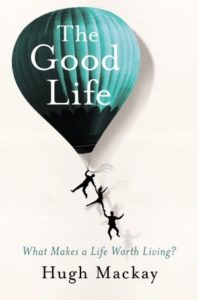A bit of a departure from my normal fiction reading – this was recommended by a friend and I took a long time reading it. I read a little bit at a time taking copious notes.
Here is the blurb …
“No one can promise you that a life lived for others will bring you a deep sense of satisfaction, but it’s certain that nothing else will.”
Hugh Mackay has spent his entire working life asking Australians about their values, motivations, ambitions, hopes and fears. Now, in The Good Life, he addresses the ultimate question: What makes a life worth living?
His conclusion is provocative. The good life is not the sum of our security, wealth, status, postcode, career success and levels of happiness. The good life is one defined by our capacity for selflessness, the quality of our relationships and our willingness to connect with others in a useful way.
Mackay examines what is known as the Golden Rule through the prisms of religion, philosophy, politics, business and family life. And he explores the numerous and often painful ways we distract ourselves from this central principle: our pursuit of pleasure, our attempts to perfect ourselves and our children, and our conviction that we can have our lives under control.
Argued with all the passion and intelligence we have come to expect from one of Australia’s most prolific and insightful authors, The Good Life is a book that will start conversations, ignite arguments and possibly even change the way we live our lives.
I think reading it a little at a time really helped me to absorb Mr Mackay’s message, which ultimately distills down to ‘do unto others as you would have done to yourself’. It is very readable with the occasional real life example.
Here are some quotes …
If you adopt a rigid world view – religious, anti-religious, political, economic, academic, aesthetic or otherwise – you tend to see everything through the filter of your convictions, and, not surprisingly, you see what you are looking for.
Fundamentalism, religious and otherwise, is like a steel trap that imprisons the soul and inhibits freedom to wonder.
The integrity of any theory lies in its falsifiability – that is, its openness to the possibility of repudiation in the light of more evidence, fresh insights or a more creative interpretation of data whose significance was not previously understood.
Certainty is the enemy of reason and reasonableness. It fuels our complacency and arrogance, wrapping us in a cocoon of self-confidence, perhaps even self-righteousness.
Intelligence is not an achievement to be admired, or a goal to aspire to; it is mainly an accident of birth, plus or minus a bit of training and encouragement. We all have it, and some people have more than others, but intelligence in no way predicts the kind of person we are likely to become, the level of contentment we are likely to attain or the influence, good or bad, we are likely to exert on the lives of others.
The thing to nurture in our children – is not only the maximising of our intellectual potential, but the maximising of our potential for goodness.
[…] those who plug away, year after thankless year, doing their best to be faithful partners, loving parents, good neighbours and responsible citizens. These are the unsung heroes…
Painful as it can be to admit, an overly busy life – rushing here, rushing there – can be a highly effective insulation from engagement with the very people who made need you to stop running, listen to them and take them seriously enough to spend time with them.
Self-absorption is not a recognised path to goodness.
At its heart, that’s all morality is about; co-operation, mutual respect, a sense of community, a spirit of egalitarianism …
[…] we can nurture the goodness in us by associating with people whose goodness we recognise and admire, avoiding the close company of those whose self-interest infects everything they do and may infect our own thinking in the same way.
Here are some of the things I learnt while reading …
Power, wealth, status and fame have the potential to corrupt us in three ways
1. Encourage a sense of entitlement based on an assumption of superiority
2. Fuelling our greed.
3. We judge people by the same criteria we use to measure our own success.
Each life has the meaning we ourselves choose to invest in it.
This book is well worth reading, but read it a chapter at a time and give yourself a bit of time for reflection before moving on to the next chapter.
Another review …
http://www.smh.com.au/entertainment/books/the-good-life-20130517-2jrtb.html

